Imagine drifting into a restful sleep every night, waking up refreshed and energized. What if the key to this blissful slumber lies right on your plate? The intricate relationship between what you eat and how you sleep can transform your nightly rest from restless to rejuvenating. By making mindful dietary choices and timing your meals strategically, you can enhance your sleep quality and overall well-being. Dive into our comprehensive guide to discover how simple tweaks in your diet can pave the way for peaceful nights and vibrant days.
Main Key Takeaways
- Meal Timing Matters: Aligning your eating schedule with your body’s internal clock can significantly improve sleep quality.
- Sleep-Boosting Foods: Incorporate magnesium-rich almonds, serotonin-boosting kiwi, and melatonin-enhancing tart cherry juice into your diet for better sleep.
- Foods to Avoid: Steer clear of caffeine, spicy foods, high-sugar snacks, and heavy meals close to bedtime to prevent sleep disturbances.
- Essential Nutrients: Magnesium, Vitamin B6, and melatonin play crucial roles in regulating sleep patterns.
- Lifestyle Factors: Regular exercise and effective stress management techniques complement dietary adjustments for optimal sleep.
- Individual Considerations: Tailoring your diet to fit personal needs and conditions can enhance sleep quality for different demographics.
The Interplay Between Diet and Sleep
Understanding the Connection
You ever notice how a good burger can make you sleepy? Or how a cup of joe fires up your internal owl? Well, what you munch on might actually hold the keys to dreamland—or keep you wide awake counting imaginary sheep. It ain’t just how much food you gobble down, but what kind of stuff you’re swallowing and when you do it.
Your grub can mess with your inner body clock—shuffling your snooze schedule around like a bad DJ. Just getting the hang of how your smorgasbord choices shape your zzz’s can mean the difference between blissful slumber and nights spent tossing your pillow around.
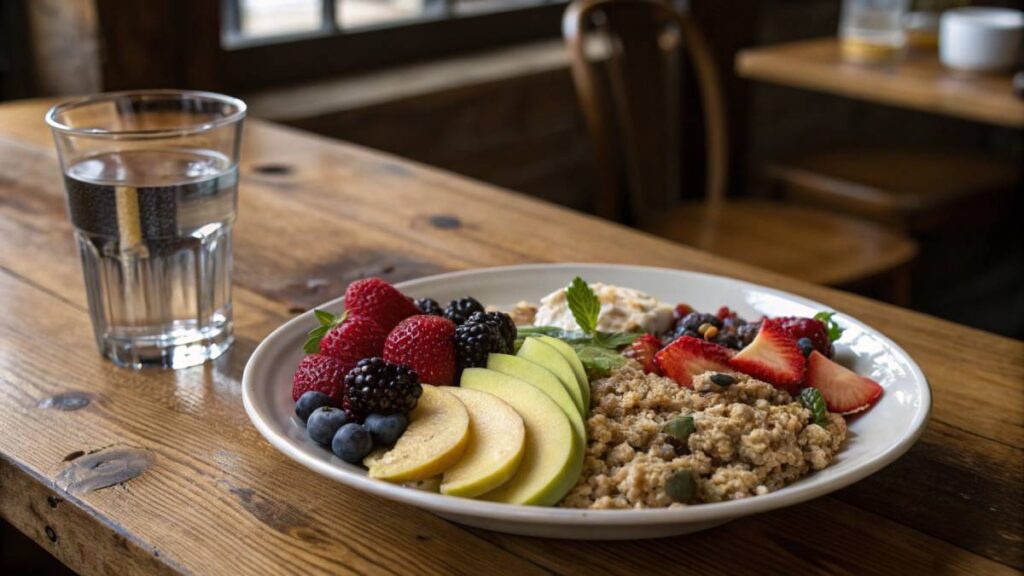
Why Diet Matters for Quality Sleep
Some goodies on your plate actually pave the way for the sandman. Others, though, can knock him off course. Melatonin and serotonin, those sleepy-time hormones, thrive on nutritious munchies. Meanwhile, that triple espresso and double chocolate fudge cake might just corner your nightly chill.
| What You Eat | Sleep Drama Unfolds |
|---|---|
| Rainbow Plate (fruits, veggies, lean goodness) | Rock-solid shut-eye |
| Caffeine Kingpins (coffee, Cola, candies) | Heads-up alertness at the wrong hours |
| Sugar Bombs (sweets, goodies) | A restless night factory |
| Grease-Heavy Banquet | Stomach fuss, sleep chaos |
Stack your meals with the right stuff and dodge the sandman’s foes—you’ll be set for serene, silky dreams. Hit up our ideas on sleep and wellness to uncover more nifty tricks.
Picking the right nosh helps your body and your noggin. It’s like a one-two punch against stress, putting the “z” in your sleep routine. For that little extra somethin’, shuffle through some relaxing sleep-inducing meditations. Wrap your head around how food and dreams interweave, and you might just hit the jackpot on sleep and keep rollin’ into easy days.
Impact of Diet on Sleep Quality
What you eat, and when, can really mess with how well you snooze. Some grub will tuck you in like a warm blanket, while others will keep you tossing and turning all night.
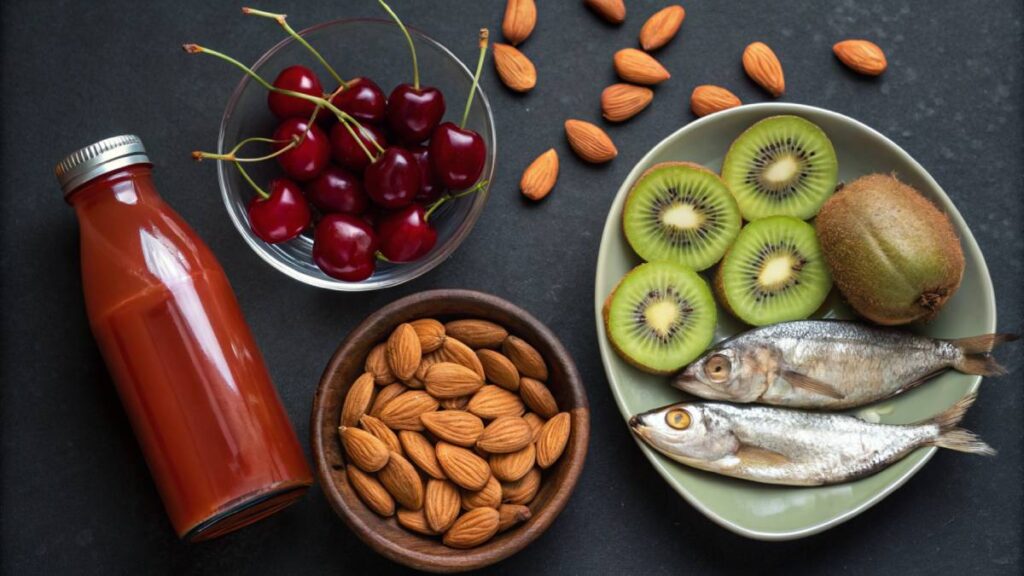
Foods That Promote Better Sleep
Certain treats work like a magic kit for sleeping, filling you with chill vibes and evening out your sleep cycles. Munching on these could have you snoozing like a baby.
| Food | Sleep Helper |
|---|---|
| Almonds | Magnesium |
| Chamomile Tea | Chill-out Antioxidants |
| Kiwi | Serotonin Booster |
| Tart Cherry Juice | Melatonin |
| Fatty Fish | Sunny Vitamin D, Omega-3s |
| Walnuts | Melatonin, Omega-3s |
| Warm Milk | Tranquil Tryptophan and Calcium |
- Almonds: Packed with magnesium, helping your muscles loosen up and letting sleep sneak in.
- Chamomile Tea: Loaded with apigenin, it’s like a warm hug in a cup to relax you into dreamland.
- Kiwi: Nature’s little serotonin shot to keep your sleep on track.
- Tart Cherry Juice: This tart drink boosts melatonin and helps you drift off to sleep city.
- Fatty Fish: With goodies like Vitamin D and omega-3s, they’re bedtime’s best buddy.
- Walnuts: Double team of melatonin and omega-3s to keep the z’s flowing.
- Warm Milk: As cozy as your grandma’s quilt, with tryptophan and calcium soothing you into slumber.
If you’re hungry for more sleep-boosting tips, hit up our article on natural sleep aids.
Foods That Disrupt Sleep
Some snacks are sleep’s worst enemy—before you know it, you’re up counting sheep ‘til dawn.
| Food or Beverage | Sleep’s Frenemy |
|---|---|
| Caffeine | Wired Buzz |
| Alcohol | Sleep Wrecker |
| Spicy Foods | Gut Buster |
| High-Sugar Foods | Energy Jolt |
| Heavy Meals | Belly Bloat |
- Caffeine: Lurking in coffee, tea, and chocolate, caffeine keeps you buzzing way past bedtime.
- Alcohol: Knocks you out fast but wrecks your beauty sleep—ain’t that a kicker?
- Spicy Foods: Love them now, hate the heartburn they bring in bed.
- High-Sugar Foods: Sugar highs mean you’re wide-eyed when you should be dreaming.
- Heavy Meals: Stuffing yourself silly makes for a rough ride to sleep island.
Watch what you put in your mouth, and you could set yourself up for sounder sleep. Peek at our guide on sleep hygiene to get your sleep spot on.
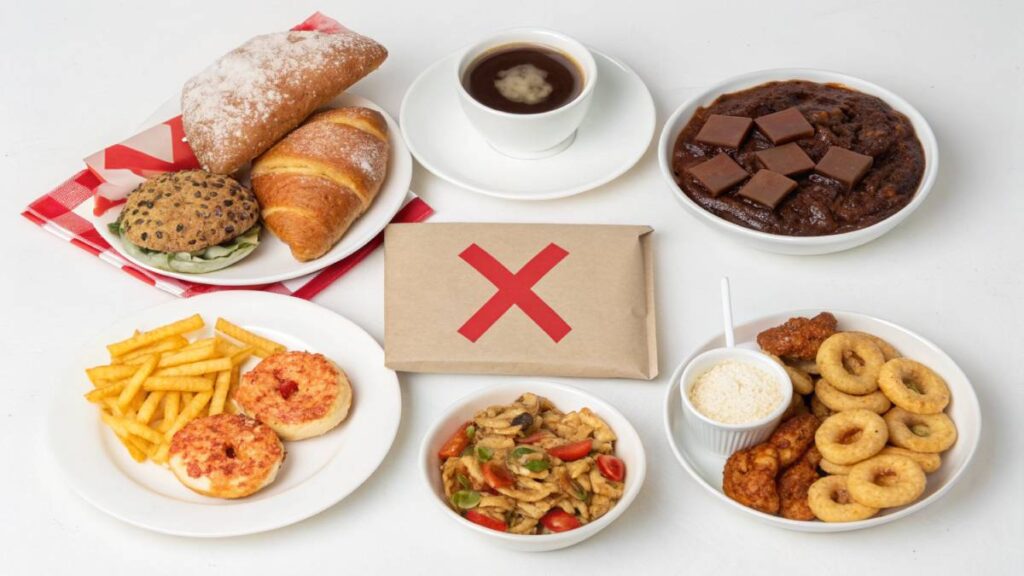
Essential Nutrients for Sleep
Eating right ain’t just about keeping the waistline in check—it’s about sleeping like a baby, too. Certain nutrients are like magic pixie dust for your body’s snooze button. Busy folks, stressed-out parents, and wise old owls can amp up their bedtime with a few dietary tweaks.
“Certain nutrients are like magic pixie dust for your body’s snooze button.” – Health & Wellness Expert
Magnesium
Ever wish you could just shut down like a computer at night? Magnesium might be your IT guy. It’s great for chilling those muscles and taking the stress-o-meter down a notch—just what the sleep doctor ordered. Plus, it helps pump up the GABA (gamma-aminobutyric acid for you science nerds) that tells your brain it’s sleepytime. Check out these tasty magnesium-packed pals:
| Food | Magnesium Content (mg) per 100g |
|---|---|
| Pumpkin Seeds | 592 |
| Spinach | 79 |
| Almonds | 270 |
| Dark Chocolate | 228 |
Get some of these bad boys in your diet, and you might just dream about unicorns skipping through clouds. Wanna see how breaking a sweat can help you catch more Z’s? Take a look at exercise and sleep.
Vitamin B6
If happiness had a vitamin, it’d be B6. It kicks serotonin (your body’s happy juice) into gear, which then spins melatonin—the hormone whispering “zzzz” to your brain. Munch on these Vitamin B6 champions:
| Food | Vitamin B6 Content (mg) per 100g |
|---|---|
| Chickpeas | 0.55 |
| Tuna | 1.04 |
| Bananas | 0.37 |
| Potatoes | 0.30 |
Add these goodies to your grub rotation, and sunshiney serotonin just might escort you to a better night’s rest.
Melatonin-Boosting Foods
Melatonin is the DJ spinning those bedtime tunes in your body. Some grub can goose up those levels and have you nodding off in no time. Here’s the low-down:
| Food | Melatonin Content (ng) per 100g |
|---|---|
| Tart Cherries | 1350 |
| Grapes | 60 |
| Tomatoes | 34 |
| Walnuts | 270 |
Chow down on these, and your body clock might become as regular as grandma’s favorite bedtime story. Curious about more natural tricks for snoozing? Check out natural sleep aids.
Mixing in key players like magnesium, Vitamin B6, and melatonin-boosting snacks could be your golden ticket to dreamland. When you pair these with a few lifestyle tweaks like those stress-busting routines we gab about in stress management for sleep, sleep can turn from a nightmare into a dream come true.
Timing Matters: Eating for Sleep
Eating at the right times can seriously spruce up your snooze game. Knowing when to chow down can boost your sleep pattern and make you feel better all around.
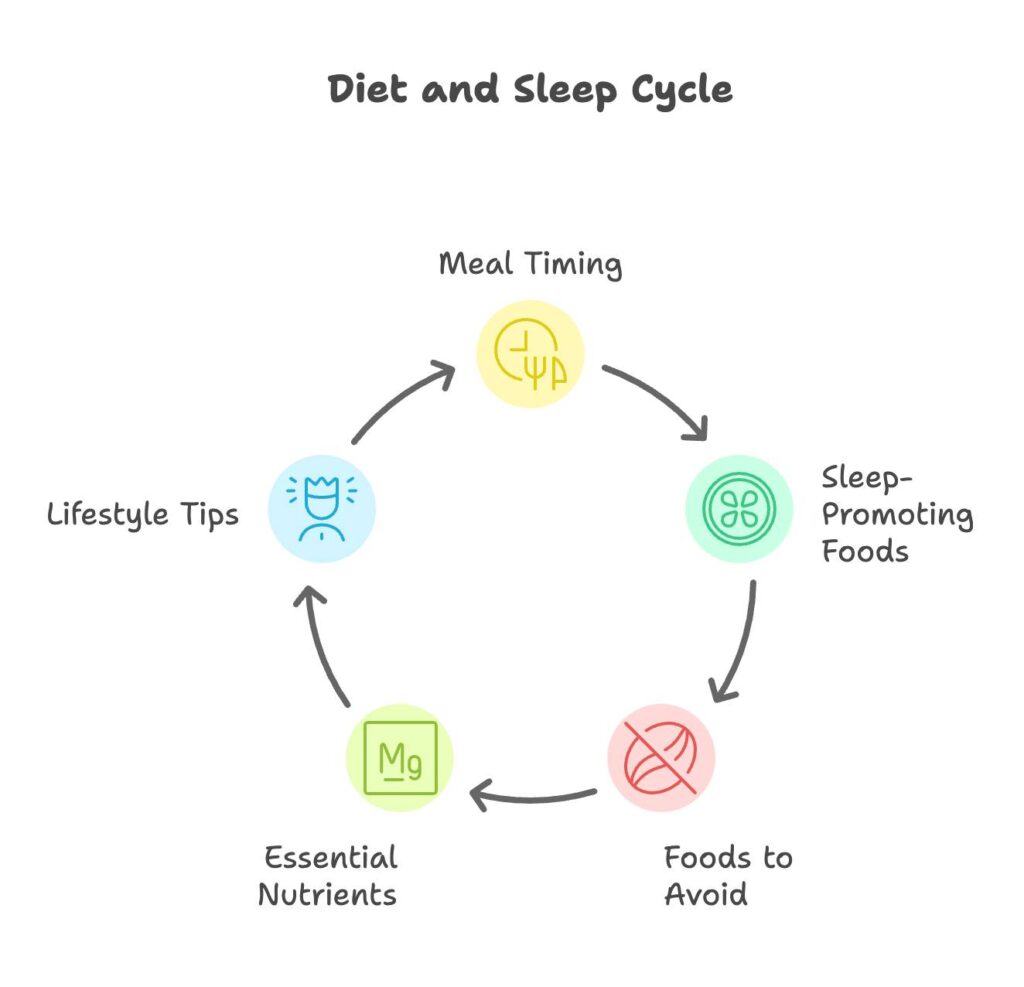
Best Time to Eat for Optimal Sleep
Getting your mealtime mojo right can really upgrade your sleep. Here’s when you should put the feedbag on to catch more z’s:
- Morning Munchies: Gobbling down a good breakfast helps set your body clock, kick-starting a productive day and leading to sweet dreams at night.
- Midday Munch: A hearty lunch keeps you ticking and avoids those “gotta nap” moments that mess with sleep vibes.
- Evening Eats: Stick to a light dinner about 3 to 4 hours before you hit the sack. It gives your tummy a chance to process, so there’s no tossing and turning.
| Meal Timing | Recommended Time |
|---|---|
| Breakfast | Within an hour of rising and shining |
| Lunch | Around noonish, say 12:00–1:00 |
| Dinner | Aim for 3 to 4 hours before hitting the hay |
Keepin’ these snack attack times in check helps with a smooth sleep routine.
Late-Night Snacks to Avoid
Some nibbles can be major sleep saboteurs. Steer clear if you want to snooze like a champ:
- Caffeinated Sippers: Coffee, tea, and fizzy pop pack a caffeine punch, keeping you on edge.
- Fiery Foods: Could torch your belly, messing with those restful hours.
- Sweet Stuff: Sugar rushes can flip your system, making it hard to settle down.
- Booze: Might knock you out at first, but watch out for broken sleep.
- Big Belly Busters: Rich meals just linger in your gut, making it tough to drift off.
| Late-Night Snack | Cause for Concern |
|---|---|
| Coffee | Filled with caffeine |
| Spicy Foods | Fuel for indigestion |
| Candy | Sugar overload |
| Alcohol | Interrupts sleep stages |
| Heavy Meals | Stomach’s nightmare |
Ditch these demon snacks and you’ll sleep easy. For more ways to munch right for better slumber, check out our guide on sleep hygiene.
With some time-tweaked eating and wise munchie choices, you can catch better z’s, boosting your well-being. Had trouble sleeping? Look into sleep disorders or maybe chill out with some essential oils for sleep.
Creating a Sleep-Friendly Diet Plan
Getting a good night’s sleep might seem like chasing a dream, but with some clever choices at mealtime, you can set yourself up for some seriously refreshing shut-eye. It’s all about picking the right eats that jive with your body’s snooze cycle. Let’s look at foods that invite the sandman and how the whole package of carbs, protein, and fats plays its part.
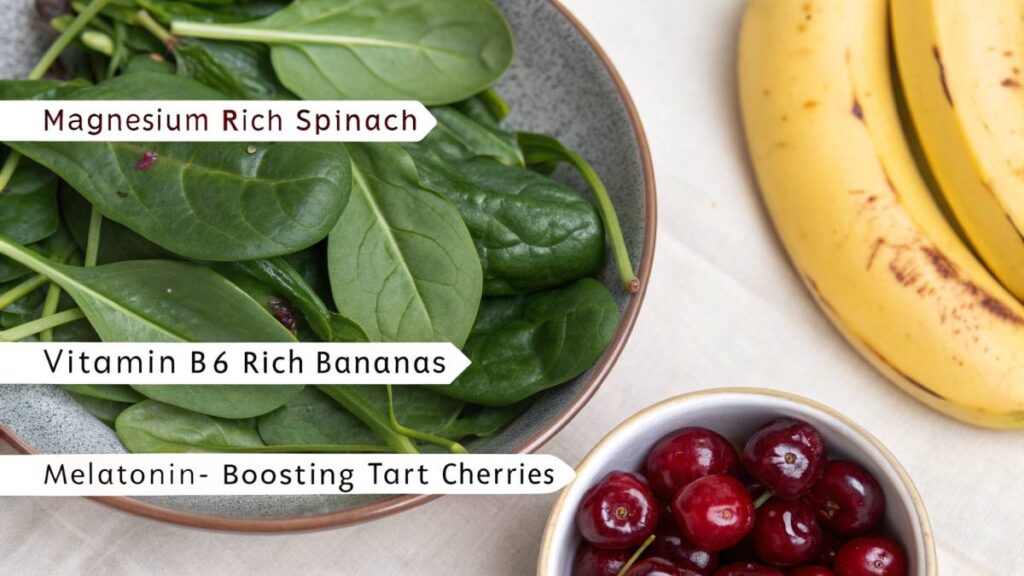
Incorporating Sleep-Boosting Foods
Spice up your shopping list with goodies that pack a snooze-inducing punch. These all-stars on the sleep front are packed with nutrients that help put your mind and body on the fast track to dreamland.
Check out these sleep-friendly munchies:
- Almonds: Chock-full of magnesium, those little nuts that could help you chill and catch some more Zs.
- Kiwi: Sweet and tart, this fruit’s got serotonin—nature’s little helper for keeping sleep on track.
- Chamomile Tea: Cozy up with a cup; the antioxidants might just keep sleep sedatives working overtime.
- Fatty Fish: Loaded with omega-3s and Vitamin D, helping you drift off with the expertise of a sea captain.
- Walnuts: Melatonin in these nutty wonders sings lullabies to your brain, prepping it for snooze town.
| Food | Star Ingredient | Sleep Perk |
|---|---|---|
| Almonds | Magnesium | Kickstarts better sleep |
| Kiwi | Serotonin | Keeps sleep steady |
| Chamomile Tea | Antioxidants | Nudges you to relax |
| Fatty Fish | Omega-3, Vitamin D | Enhances sleep quality |
| Walnuts | Melatonin | Sleep’s best friend |
Balancing Macronutrients for Sleep
It’s not just about what’s on your plate, but what plays nicely together. Balancing carbs, protein, and fats is like fine-tuning sleep with a bedtime orchestra.
- Carbohydrates: Opt for complex carbs like whole grains to boost tryptophan, the sleepy hormone’s best buddy.
- Proteins: While proteins support overnight muscle mending, keep it light at night—nobody wants a tummy rumble playlist when trying to sleep.
- Fats: Healthy fats, such as those in avocados and nuts, work behind the scenes supporting hormonal harmony and brain health.
| Macronutrient | Examples | Sleep Role |
|---|---|---|
| Carbohydrates | Whole grains, fruits | Boosts tryptophan |
| Proteins | Lean meats, legumes | Aids muscle healing |
| Fats | Avocado, nuts | Spurs hormone production |
With the right food dance, sleep becomes an easier partner. Whether you’re juggling work-life stress, wrangling kiddos, or just trying to get those golden years in without waking at weird hours, hone in your diet to be a sleep ally. Swing by our other articles on sleep and wellness, which dive into more tips for crafting a snooze-friendly life.
Blending the sleep-boosting foods with a balanced diet can seriously dial up those quality hours under the covers. Want the extra edge? Explore our guides on meditation for sleep and yoga for sleep for more bedtime hacks to cozy up with your fresh, sleep-enhancing diet plan.
Lifestyle Factors Affecting Diet-Sleep Relationship
The delicate dance between how we eat and how we snooze means our day-to-day choices shake up sleep and diet together. Two major players in this dance are getting up and moving around, and finding cool ways to chill out.
“The delicate dance between how we eat and how we snooze means our day-to-day choices shake up sleep and diet together.” – Nutritionist Insights
Regular Exercise
Getting off the couch does wonders for snoozing soundly. Moving your body brings your internal clock in line, making falling asleep and staying there a piece of cake. Plus, it can wave goodbye to insomnia and breathing problems during the night. What you do, how intense it is, and when you do it all matter.
| Exercise Type | Impact on Sleep |
|---|---|
| Leisurely Jog or Walk | Better and longer shut-eye |
| Pumping Iron | Deep sleep boost |
| Quick, Hardcore Sessions | Might keep you up if too close to lights-out time |
Shoot for at least 150 minutes of talking-while-you-move activity, or 75 minutes of breath-catching exercise weekly. However, keep those energetic moves away from bedtime, otherwise they might keep your eyes wide open. Curious? Check out our piece on exercise and sleep.

Stress Management Techniques
Stress is a killjoy for sleep. So adding in stress-melting tactics can tune up your shut-eye pleasure. Chronic stress can ruin your night’s rest, so keeping it under control helps your overall sleep quality go up.
Check out these stress busters:
- Meditation: Silence that mental chatter. Head over to our meditation for sleep guide for peaceful dreaming tips.
- Yoga: Those simple moves and breaths do wonders. Dive into our yoga for sleep article for more.
- Journaling: Dump your day’s dreams and dreads on a page – it clears headspace for rest.
- Aromatherapy: Sniff lavender and let calm wash over you. Snooze-inducing scents explored in essential oils for sleep.
| Technique | Benefit for Sleep |
|---|---|
| Meditation | Kills stress, adds zen |
| Yoga | Raises relaxation, soothes muscles |
| Journaling | Empties mind, cuts pre-sleep worries |
| Aromatherapy | Relaxes, eases into sleep |
These chill-out tricks bring diet and sleep closer for a happier you. To dive deeper into stress-busting for better zzz’s, hit up our stress management for sleep page.
Further Considerations
Sure, knowing how food fits into the sleep game is key, but don’t ignore your day-to-day hustle or stress levels. Eating right wrapped up in a positive lifestyle leads the way to top-notch sleep health.
Getting moving and squashing stress mean a better sleep experience and a happier life. Learn more about how sleep and wellness can make health-smart choices part of your everyday.
Individual Considerations
Everyone’s got a unique relationship with what they eat and how they sleep. It’s like trying to use the same key for a hundred different locks—it just doesn’t work. Tweaking your diet to fit your sleep needs is a game-changer for catching those Z’s and feeling great.
Adapting Diet for Different Sleep Needs
We’re all running different races, whether you’re chasing deadlines, kids, or personal bests. What you munch on can really change how well you snooze at night.
- Busy Professionals: Stress got ya wired? Foods rich in magnesium like almonds might just help you chill out and hit the hay smoother.
- Parents and Kids: If bedtime’s a battle for the family, loading up on sleep-friendly bites like bananas and milk might make a difference.
- Older Folks: Sleep changes with age like everything else. Cherries and oats can give a boost to melatonin, helping folks get their beauty rest.
- Chronic Conditions Sufferers: If diabetes is part of the mix, keeping sugar in check is key—not just for health but for getting some decent shut-eye.
- Fitness Buffs: Think recovery! A combo of protein and carbs after a workout could lead to some solid sleep.
- Students and Shift Workers: Keeping energy levels up with complex carbs and lean proteins can help deal with those odd-hour jobs or study sessions.
- Health Nuts: A balanced diet with all the nutrients can play a big role in peaceful nights.
- Those with Insomnia: Foods like turkey and kiwi might be the natural sleep aids you’re missing.
Consulting a Healthcare Provider
Your plate holds the secret to good sleep, but before you make huge changes, remember that healthcare providers are like your personal sleep and diet librarians. They help you sort out what’s best for you and might even point you to a dietitian if you need more focused help.
| Sleep-Related Issues | What to Do |
|---|---|
| Stress and Anxiety | Chat with a pro about managing stress—maybe try meditation for sleep. |
| Diabetes | Look into diets keeping blood sugar steady. Dive into mental health for sleep resources too. |
| Chronic Pain | Ask about anti-inflammatory diets and pain management tips. |
| Hormone Imbalances | Seek out nutritional advice for hormone-centered sleep problems. |
Providers might recommend gadgets like sleep trackers to get a handle on your sleep habits, so you can make changes where needed. Check out our sleep hygiene guide for more. Getting active and doing something chill like yoga for sleep can work hand in hand with eating right for a better snooze fest.
Main Tips
- Strategic Meal Timing: Eat breakfast within an hour of waking, have lunch around noon, and enjoy a light dinner 3-4 hours before bed.
- Incorporate Sleep-Friendly Foods: Add almonds, kiwi, tart cherry juice, fatty fish, walnuts, and warm milk to your diet.
- Avoid Sleep Disruptors: Steer clear of caffeine, spicy foods, high-sugar snacks, alcohol, and heavy meals in the evening.
- Balance Macronutrients: Ensure a good mix of carbohydrates, proteins, and healthy fats to support sleep.
- Manage Stress: Practice meditation, yoga, journaling, or aromatherapy to reduce stress and enhance sleep quality.
- Regular Exercise: Engage in at least 150 minutes of moderate activity weekly, but avoid intense workouts close to bedtime.
Final Thoughts
Transforming your sleep isn’t just about what happens in the bedroom; it’s deeply intertwined with your daily habits and dietary choices. By understanding and implementing the right meal timings and incorporating sleep-friendly foods into your diet, you empower your body to naturally regulate its sleep patterns. Remember, achieving quality sleep is a journey tailored to your unique needs and lifestyle. Combining these nutritional strategies with regular exercise and effective stress management can lead to profound improvements in your sleep quality and overall health. Don’t underestimate the power of small, consistent changes—they can make a significant difference in how you feel each morning. Embrace these insights and commit to a balanced approach, and you’ll soon find yourself enjoying the restful nights you deserve.
Conclusion
Achieving quality sleep is a harmonious blend of mindful eating, balanced nutrition, and healthy lifestyle practices. By strategically timing your meals and selecting foods that promote relaxation and hormone regulation, you set the stage for uninterrupted and restorative sleep. Incorporating magnesium-rich almonds, serotonin-boosting kiwi, and melatonin-enhancing tart cherry juice can make a tangible difference in your nightly rest. Additionally, avoiding sleep-disruptive foods like caffeine and heavy meals ensures that your body isn’t working against its natural sleep rhythms. Complementing your diet with regular exercise and effective stress management techniques creates a holistic approach to sleep health. Remember, everyone’s sleep needs are unique, and personalizing your diet to address specific conditions or lifestyles can lead to the most significant improvements. Embrace these dietary and lifestyle changes to transform your sleep experience, waking up each day feeling truly refreshed and ready to take on the world.
FAQs
What are the best foods to eat for better sleep?
Incorporate magnesium-rich almonds, serotonin-boosting kiwi, melatonin-enhancing tart cherry juice, fatty fish, walnuts, and warm milk into your diet to promote better sleep.
Which foods should I avoid to improve my sleep quality?
Avoid caffeinated beverages like coffee and tea, spicy and high-sugar foods, alcohol, and heavy meals close to bedtime to prevent sleep disruptions.
How does meal timing affect sleep?
Eating meals at the right times helps regulate your body’s internal clock, improving sleep patterns. Aim for breakfast within an hour of waking, lunch around noon, and a light dinner 3-4 hours before bedtime.
Can stress management improve my sleep?
Yes, incorporating stress-busting techniques like meditation, yoga, journaling, and aromatherapy can enhance sleep quality by reducing anxiety and promoting relaxation.
Are there specific nutrients essential for sleep?
Magnesium, Vitamin B6, and melatonin are crucial for regulating sleep hormones and improving overall sleep quality.








